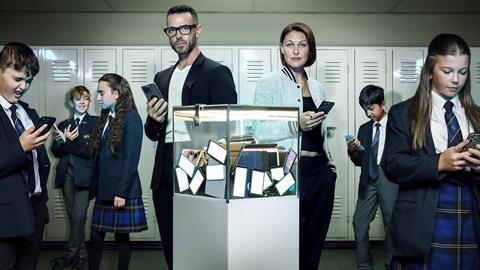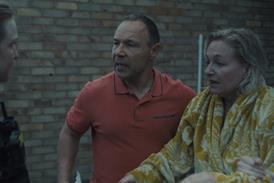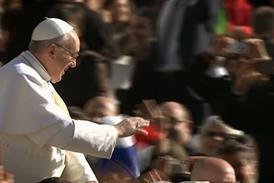“This is deeply uncomfortable hour of television that will serve as a wake-up call for all of us with children in the digital age”

Swiped: The School That Banned Smartphones, Channel 4
“The existential threat posed by smartphones was never something an accessible two-part Channel 4 documentary was going to comprehensively address, but simply flagging the sheer size and profundity of the issue feels like a start. And the programme does effectively home in on some of the more tangible aspects of the problem – such as the grim content teenagers have access to on their phones.”
Rachel Aroesti, The Guardian
“The effect of watching the two episodes is best seen in the faces of the hosts, married celebrities and parents-of-three Emma and Matt Willis. They begin the three-week experiment chipper and curious, they end it haunted and slightly sickened. There was no end of spine-chilling facts and figures on offer here – it was like a video-nasty special of Inside the Factory.”
Chris Bennion, The Telegraph
“The Willises are a professional celebrity couple, as happy to do Cooking With The Stars as they are to front a documentary about drugs. But they made the ideal presenters for this, because they have three children aged eight to 15 — and no clue about what risks their phones could pose. With the second episode this evening, this is a deeply worrying programme. While it avoided trivialising the issues, it didn’t have time to do much more than touch on some of the most horrible aspects, such as the prevalence of sites that encourage eating disorders and self-harm.”
Christopher Stevens, Daily Mail
“Swiped: The School That Banned Smartphones showed beyond doubt, we have to do something. Because the problem is serious and the consequences possibly catastrophic. Emma and Matt Willis talked to experts who said that this dross and the endless scrolling for a dopamine hit is making them lose grey matter. Their brains are affected in the same way that drug abusers’ are. It is all quite disturbing.”
Carol Midgley, The Times
“This is deeply uncomfortable hour of television that will serve as a wake-up call for all of us with children in the digital age. Is it something to watch with your own kids? It’s profoundly disturbing and probably not very suitable. But then, what they will see on their phones, maybe with their friends, or perhaps alone in their bedrooms late at night, could be much, much worse.”
Marianne Levy, The i
No Good Deed, Netflix
“Each instalment twists and teases, nicely setting up the binge. The episodes are short, pacy, and packed with plot, so it’s all too easy to let the next one roll. It doesn’t exactly go for the subtle approach, preferring to hammer the puzzle pieces together with a clumsy fist. It may be so light as to make me wonder whether the idea or the punny title came first, but it is enjoyable, nevertheless.”
Rebecca Nicholson, The Guardian
“The Netflix eight-parter sits atop a barmy plot: a pair of empty-nesters are selling their picture-perfect Los Angeles house, and they and the three bidding couples who want to buy it become embroiled in the kind of psychological cat’s cradle that only exists on a wall of scriptwriter’s Post-It notes. But because Netflix is able to rope in actors from the very top drawer – Lisa Kudrow, Ray Romano, Linda Cardellini and Luke Wilson – to what is frankly quite middling series television, No Good Deed just about pulls it off.”
Benji Wilson, The Telegraph
“Even though it’s all a lot of fun and being over the top is sort of the point, there is just too much going on. I managed to make it through the entire series without ever learning the names of Abbi Jacobson and Poppy Liu’s characters (Leslie and Sarah, apparently) while O-T Fagbenle and Teyonah Parris’s storyline vanishes completely for one of the eight episodes. With the show’s energy diverted to so many characters, its final big reveal just blends in to all the rest of the chaos going on. As we enter the season of excess, No Good Deed is no turkey – but it is certainly overstuffed.”
Rachel Sigee, The i































No comments yet